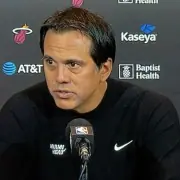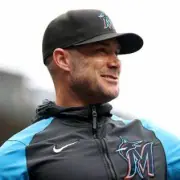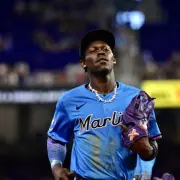What’s Wrong with Sandy Alcantara? A Deep Dive into His 2025 Struggles
What’s Wrong with Sandy Alcantara? A Deep Dive into His 2025 Struggles
Just two years removed from a Cy Young Award, Sandy Alcantara now finds himself mired in one of the worst stretches of his career. The 6-foot-5 Marlins ace, once revered for his dominance, durability, and pinpoint command, has opened the 2025 season with a 2–3 record, an alarming 8.31 ERA, 1.65 WHIP, and nearly as many walks (17) as strikeouts (19) over 26 innings. For a pitcher who once threw 228.2 innings with a 2.28 ERA in 2022, the drop-off has been nothing short of staggering. So, what’s behind the rapid unraveling? Let’s dig in.
Statistical data found via BaseballSavant
 What’s Going Wrong with Sandy Alcantara?
What’s Going Wrong with Sandy Alcantara?
1. Command Is Collapsing
The most glaring issue? Alcantara’s walk rate has ballooned to 14.2%, placing him in the 11th percentile league-wide. This isn’t just bad—it’s among the worst in baseball. His strikeout-to-walk ratio has cratered from 4.1 in 2022 to 1.1 in 2025, suggesting a pitcher not just nibbling, but losing control altogether. He’s falling behind in counts and often having to groove pitches, leading to barrels and crooked numbers.
Something to ask about his lack of command is his lowered arm slot, it is down to 31 degrees, three degrees less than that of 2022 and 2023.
2. Velocity Holding, But Command Diminishes Its Value
While Alcantara’s average fastball velocity remains strong at 97.0 mph (89th percentile), it isn’t nearly as effective when hitters know it’s coming. His fastball run value is -2, and batters have a .419 xwOBA against it.
The four-seamer’s whiff rate has dropped from 24.2% in 2022 to just 11.1% in 2025, and its xSLG has ballooned to .602, a sign that it’s no longer missing barrels. Velocity isn’t enough—command and deception are missing.
3. Sinker & Changeup Aren’t Getting Results
In 2022, Alcantara’s sinker and changeup formed one of the most devastating ground-ball inducing combos in baseball. This year, the results are dramatically worse, despite similar usage and velocity.
Pitch Comparison – 2022 vs 2025
| Pitch | Year | AVG | SLG | wOBA | Whiff% | Put Away% | Run Value |
|---|---|---|---|---|---|---|---|
| Sinker | 2022 | .264 | .342 | .299 | 11.1% | 15.7% | +9 |
| 2025 | .333 | .500 | .415 | 10.5% | 6.3% | -1 | |
| Changeup | 2022 | .146 | .195 | .170 | 34.6% | 27.1% | +27 |
| 2025 | .207 | .310 | .269 | 37.9% | 10.3% | -0 |
Both pitches have lost vertical separation, are missing fewer bats, and are getting hit harder—especially the sinker. Even the changeup, once a wipeout pitch, has lost effectiveness across every category. Ground balls aren’t saving him either as he’s constantly getting barreled.
4. Predictability in Pitch Mix
Alcantara continues to lean heavily on a familiar trio: changeup (27%), sinker (26%), and four-seam fastball (20%). While that worked in 2022, the predictable sequencing has caught up with him. Hitters are sitting on the sinker or change, knowing they’ll likely see one early in the count.
His slider and curveball remain underused—despite the slider generating a 39.3% whiff rate this year. Except when the slider gets hit, it gets hit quite hard with an xSLG of .877.
The curveball, while used just 10.8% of the time, has a microscopic .195 xwOBA against it and 28.6% whiff rate, suggesting it’s an untapped weapon in his arsenal. In 2022, Alcantara’s offspeed pitches had elite run value—this year, they’re just average.
5. Underlying Metrics Confirm the Struggles
Statcast paints a grim picture in 2025—and the percentile rankings only emphasize how far he’s fallen from his Cy Young peak.
| Metric | 2022 | 2025 | 2025 Percentile |
|---|---|---|---|
| xERA | 2.90 | 6.39 | 8th percentile |
| Hard-Hit Rate | 38.5% | 46.4% | 23rd percentile |
| Barrel % | 5.3% | 10.7% | 17th percentile |
| Avg Exit Velocity | 87.8 mph | 91.0 mph | 28th percentile |
| Whiff % | 25.6% | 25.1% | 50th percentile |
| K% | 23.4% | 15.7% | 20th percentile |
His chase rate is down to just 24.1% (23rd percentile), indicating hitters aren’t being fooled by pitches out of the zone.
These indicators paint a picture of a pitcher who’s no longer fooling hitters, missing barrels, or winning counts—and opponents are punishing everything in the zone.
The 46.3 swing percentage also shows more patience from the hitters he is facing.
Can He Turn It Around?
Sandy Alcantara is still only 29, and his raw stuff hasn’t disappeared. But between shaky command, predictable sequencing, and ineffective secondaries, he looks lost on the mound. The Marlins’ defense and lack of run support only magnify the problem. To turn things around, Sandy needs to:
-
Regain feel for the strike zone
-
Introduce sharper breaking pitches into his game plan
-
Vary his sequencing and approach to hitters
The tools are still there, but the margin for error is gone—and unless something changes quickly, his season could spiral even further from his Cy Young form.
What Does This Mean for His Future?
Sandy and all Marlins stars will always be the center of trade talks, but these performances aren’t doing anything to bolster his value, if anything it is being diminished. This could be seen as a win for the Marlins as they can maybe keep Sandy with their young bolstering core, but regardless Sandy must improve.
Twice this season, Alcantara has allowed at least six runs in three or fewer innings—an alarming stat for a pitcher who once prided himself on being the rock of the rotation. After Tuesday’s latest meltdown, he didn’t mince words.
“I feel good physically, but I feel terrible just being out there and having the same result and I can’t do nothing when my teammates need me the most,” Alcantara told MLB.com. “I know this is a process, but I’m tired. I’m tired of having the same success out there, and I don’t feel happy about it.”
The quote was telling—not just because of the frustration, but because Alcantara described his performance as “success,” likely a translation slip that just shows how disoriented and defeated he feels mentally. Just two years removed from being the league’s most dependable workhorse, he now finds himself at a crossroads.
Sandy is coming off tommy john and that is not an easy journey, yet he has still underperformed.
The Marlins entered the year unsure whether to hold or shop the 29-year-old righty, who is under contract for $17.3 million in both 2025 and 2026, with a $21 million team option for 2027. But at this rate, his trade value is at a low point, and a move seems unlikely unless he rebounds.
Manager Clayton McCullough offered support, but also an honest assessment:
“We just have to kind of go back to work there and try to figure that out. It’s so uncharacteristic for him… It was really a struggle from the first inning tonight, just never really could catch a rhythm and get settled in,” McCullough said. “Some pitches that were kind of more heart of the plate, they put some good swings on. But I think for me, it’s just as much trying to get back to commanding and executing pitches at the rate that we’re all accustomed to.”
“We’ll put our heads together with him and just see what we think is the next best step to try to right the ship a little bit. We certainly all know there’s a much better version there.”
That better version feels distant right now. But if Alcantara can rediscover his command and adjust his pitch usage, a turnaround isn’t out of the question. The tools, velocity, and track record all suggest the potential remains.
Whether that version resurfaces this season or not could determine not only the fate of the Marlins, but Alcantara’s standing among the game’s elite.

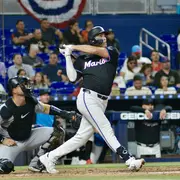
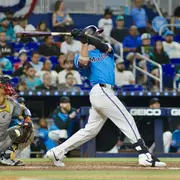
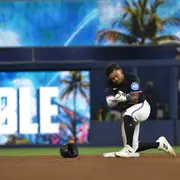
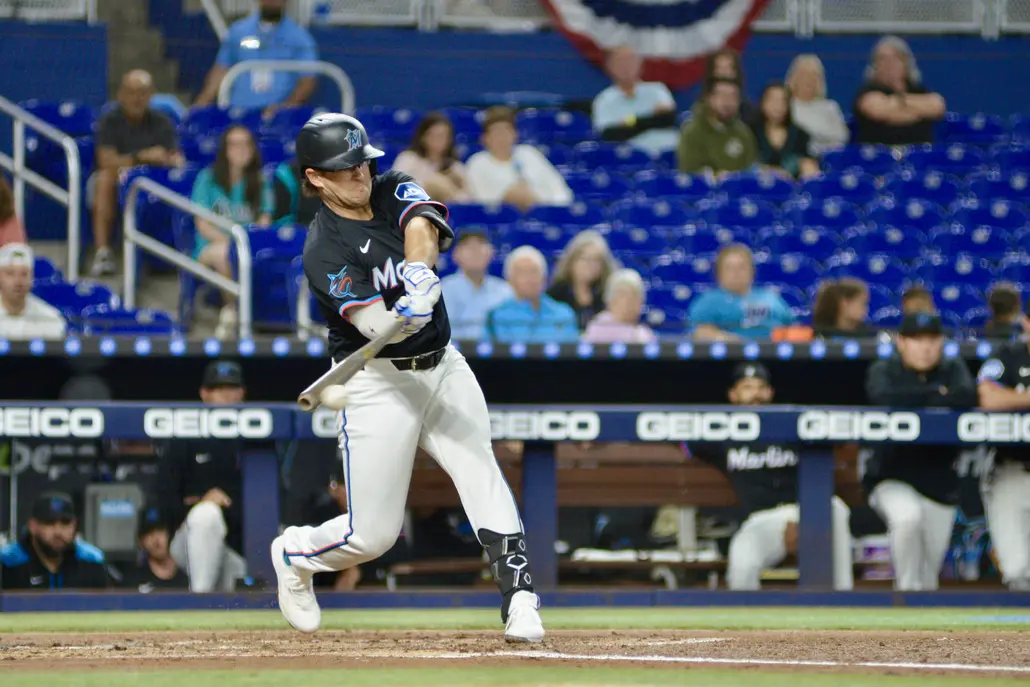 The Marlins got Jonah Bride in a trade with the Athletics before the start of last year’s spring training, after the corner infielder was designated for assignment. He was sent from one rebuild to another but at least he got to show off a bit of pop with 11 home runs in 71 games last year.
The Marlins got Jonah Bride in a trade with the Athletics before the start of last year’s spring training, after the corner infielder was designated for assignment. He was sent from one rebuild to another but at least he got to show off a bit of pop with 11 home runs in 71 games last year.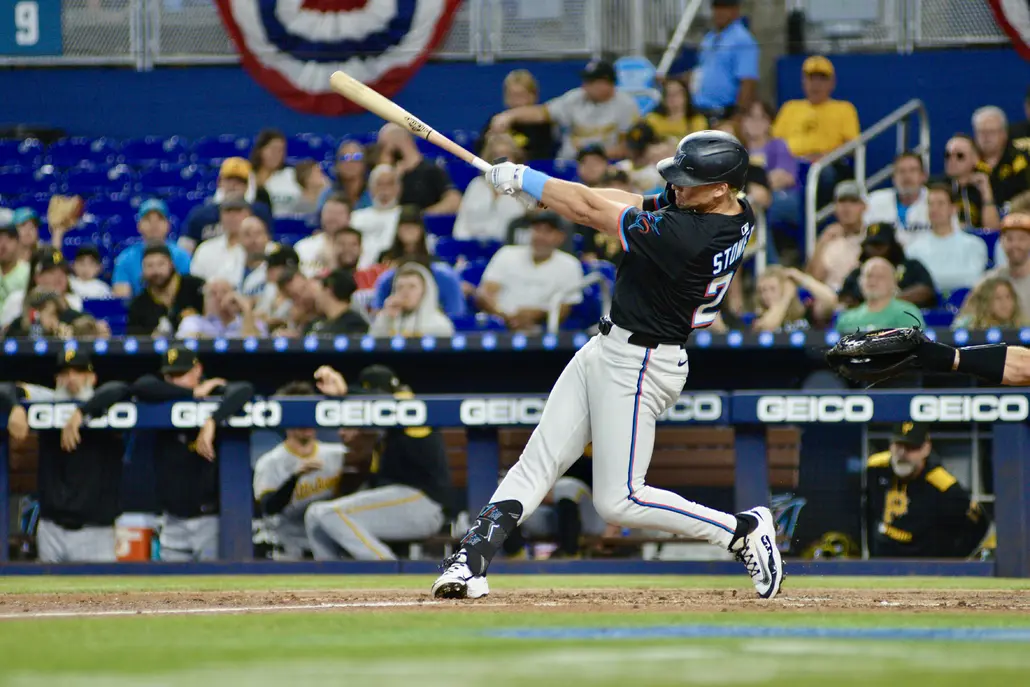 There are a few players on the active roster who were a part of key midseason trades a year ago, but they all came at the expense of a reliever. Connor Norby and Stowers were part of a trade with the Baltimore Orioles for Trevor Rogers. Graham Pauley was part of a package that sent Tanner Scott to the San Diego Padres.
There are a few players on the active roster who were a part of key midseason trades a year ago, but they all came at the expense of a reliever. Connor Norby and Stowers were part of a trade with the Baltimore Orioles for Trevor Rogers. Graham Pauley was part of a package that sent Tanner Scott to the San Diego Padres.


